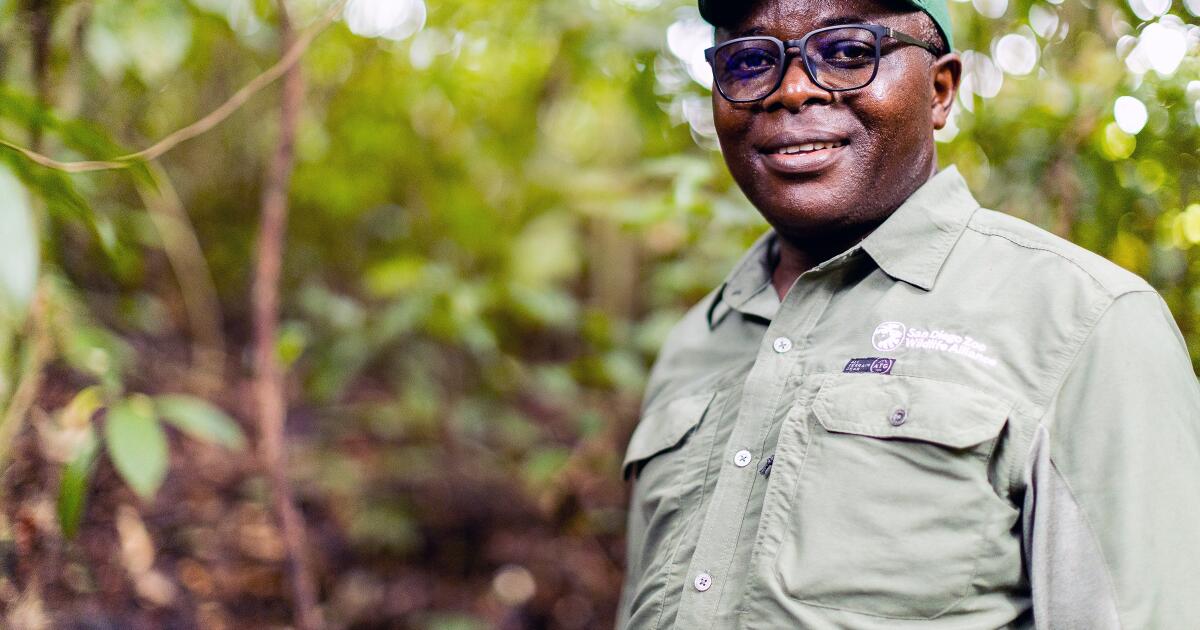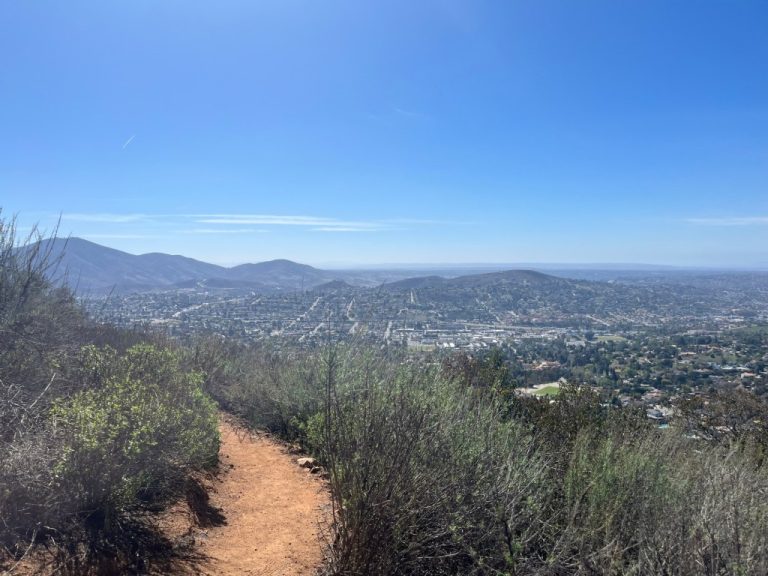
A scientist who has worked with the San Diego Zoo Wildlife Alliance for two decades, protecting habitat for endangered primates in Cameroon, has been recognized by a prestigious U.K. charity for his conservation efforts.
Ekwoge Abwe, 52, received The Prince William Award for Conservation in Africa during the 11th annual Tusk Conservation Awards in London on Monday. The prince presented the award.
Reached by phone, Abwe said the award made him feel “on top of the world” and would help bring more attention to conservation work in Africa. Two others also were honored.
Since 2003, Abwe has worked for the San Diego Zoo and led its conservation project in Ebo forest, a 490,000-acre area in Cameroon that is one of the last remaining intact forests in Central Africa and where the zoo operates two research stations. It is one of many conservation projects the alliance supports around the world as part of its mission to support and help endangered wildlife.
Ebo is considered a biodiversity hotspot, home not only to endangered species including gorillas and chimpanzees but also is a place where plant species new to science have been discovered.
Officials have credited Abwe with working to broker alliances among more than 40 traditional chiefs from tribes with historical conflicts who live near the forest. He also helped lead a campaign to dissuade the government of Cameroon from allowing logging in the forest in 2020.
He was nominated for the Prince William Award by Bethan Morgan, who heads the zoo’s African Forest Program as a consultant. They first met when she was a postdoctoral research fellow.

Prince William greets Ekwoge Abwe, the Prince William Award winner, in a white shirt, and the Wildlife Ranger Award winner Jealous Mpofu, center, at the 2023 Tusk Conservation Awards on Monday.
(Chris Jackson / Getty Images for Tusk)
“Ekwoge’s hope and belief in a better future for all is inspiring and infectious, and is evident in the significant number of young Cameroonians who call him their mentor,” she said in a statement.
Abwe’s conservation work has had an impact on local, national and international levels, said the leader of the U.K. charity that handed out the awards.
“He is a worthy winner of this lifetime achievement award and we’re honored to celebrate this true defender of biodiversity,” Charlie Mayhew, chief executive of Tusk, said in a statement.
Abwe previously was honored for his conservation work in 2013, when he received the Whitley Fund for Nature Award for engaging local communities in gorilla conservation.
Abwe recalled how he met Morgan when she was doing research on the drill, a primate that is among Africa’s most endangered. He became her research assistant.
“The first day I went into the forest, I didn’t see any drills — but I saw a gorilla. That was my first contact with a great ape,” he said. “It was just 15 meters away, and I was just there staring at this animal for about 15 minutes.”
Abwe later went back to school, earning his master’s degree in primate conservation at Oxford Brookes University in the U.K., and his doctorate at Drexel University in Philadelphia.

San Diego Zoo Wildlife Alliance scientist Ekwoge Abwe, right, speaks to group in Cameroon where he leads conservation work.
(San Diego Zoo Wildlife Alliance)
He made a huge discovery early in his research: He was with a group of local guides in the forest when he heard cracking noises and witnessed three Nigerian-Cameroon chimps using rocks as hammers to break open tough-shelled nuts. They were using tree branches as anvils.
“The group fled when they saw us and in the process one of them almost dropped its hammer on (my) head — I am not sure if it was intentional,” he wrote in an email. “The significance of this discovery is that it was only western chimpanzees west of the Sassandra River that were known to crack nuts.”
Up until that point, researchers had only found chimps using that kind of tool about 1,000 miles away, across the river — so it was thought the behavior was either a genetic trait or learned skill passed down. In a paper published in the journal Current Biology in 2006, Morgan and Abwe said the skill may have been invented independently in each place.
In his research, Abwe also found Ebo chimpanzees “fishing” for termites — making them the only known chimps in the world to both crack nuts and fish for termites.
Abwe works with those who live near the forest to try to lessen threats from logging, hunting and farming. In a video presented for the Tusk awards, Abwe said he tries empower local communities in conservation work, such as when his team held meetings with men who hunt chimpanzees for meat.
After a series of workshops, the group was “transformed” from hunters into conservationists, he said. Former hunters now volunteer in gorilla and chimpanzee “guardian clubs” and carry out monthly monitoring of great apes and educate others about the endangered animals.

San Diego Zoo Wildlife Alliance scientist Ekwoge Abwe, in green hat, talks with community members as he promotes conservation in Cameroon.
(San Diego Zoo Wildlife Alliance)
In 2020, Abwe successfully pushed back against a government decree that allowed logging in the forest. He asked other scientists and conservationists to sign a letter and lobbied government leaders.
The victory, however, was short-lived. The logging issue has come up again. “So as we speak, we are still struggling to get that overturned,” he said.
As part of the Prince William award, Abwe will receive £100,000 over three years — the equivalent of $125,000 — money he says he’ll use to further conservation work and help support and provide training for “young, dynamic, committed scientists” in Cameroon.
In a statement released by Tusk, Abwe thanked the zoo for its “unyielding support for my work, even in the face of the challenges” and said he couldn’t ask for a better advocate. He also said he was dedicating his award to “the resilient communities we work with to ensure the long-term health of people, wildlife and the environment in Cameroon.”





